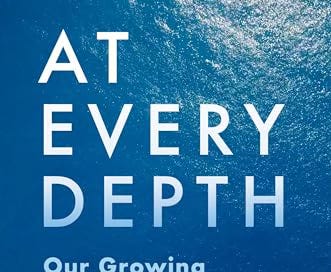At Every Depth: Our Growing Knowledge of the Changing Oceans
Tessa Hill and Eric Simons
Columbia University Press, 2024
268 pages
A professor in the Earth and Planetary Sciences Department at UC Davis, Tessa Hill researches and teaches oceanography and climate change. Hill is also a member of the Bodega Ocean Acidification Research group, which examines the effects of ocean acidification on native species, as well as a Fellow of the California Academy of Sciences and a member of the West Coast Ocean Acidification and Hypoxia Panel. Her cutting-edge work in ocean science research has been recognized by the American Geophysical Union, which honored her with the Rachel Carson Lecture, an annual award for female scientists.
With her expansive knowledge of our oceans and our warming world, Hill has teamed up with science writer and educator Eric Simons to produce At Every Depth: Our Growing Knowledge of the Changing Oceans, a book that surprised me with its fresh take on the effects that humans are having on the great bodies of water that cover our planet.
This book is unique. It not only chronicles the changes we have brought to the seas, it also tells of our changing relationships with the oceans. The chapters exploring tide pools, kelp forests, coral reefs, and other environments of the oceans include stories on the relationships that Native Americans, and other native peoples developed with those environments.
Many of those old ways of knowing and those old relationships have been lost, but ethnographers and individuals interested in carrying on their ancestors’ ways are working to preserve or rediscover them. At first, I was a bit confused as the authors took several pages to tell the story of Isabel Meadows, a Native American whose Ohlone people lived around what is now Monterey The last fluent speaker of her native tongue, an ethnographer at the Smithsonian Institution worked with her to record and preserve what she knew of her people.
So I’m thinking, “What in the world does this have to do with the changing oceans?” Yet Meadows’ memories led another woman of Ohlone heritage, decades later, to rediscover the language and knowledge of her forebears, which led her to work with traditional abalone jewelry. And this woman’s work now dovetails with present-day efforts to preserve tide pools.
Stories like Meadows’ illustrate other chapters of At Every Depth. We meet Kwaxsistalla, or as Westerners named him, Adam Dick, who, from the time he was four, was mentored by his grandparents and other elders in the language, ecology, and traditions of his First Nations people, ways of life that were suppressed by the Canadian government at the time. Now, the knowledge that Dick retained is informing modern coastal conservation and ecological restoration. Hill and Simons also the touch on the mystery of the great navigational feats of settlers of the Pacific Islands, which to the Polynesians, is no mystery at all.
There are hundreds of books about climate change and hundreds more about our imperiled oceans. I have read dozens of books on plastic pollution and the plastics in our seas. You can also find books on our rising seas, bleached coral reefs, collapsed fisheries, and ocean acidification. At Every Depth covers all these topics, yet it is the only one to take an ethnographic or cultural geographic look at this modern crisis we have inflicted upon the oceans. I’m not sure there is another book like it.
I felt a personal connection to this book, as I read much of it during my lunch breaks where I work, a small zoo and aquarium on an island in the middle of a wildlife refuge. The island skirts an estuary and the waters of San Diego Bay and seems to encapsulate the narrative of At Every Depth. As I turned the pages, I sat within a stone’s throw of shell middens left by Native Americans hundreds of years ago. Remnants of industrialization and exploitation of the ocean are found in the concrete foundations from the time the island was transformed into factory employing 1,500 men to turn kelp from the Pacific Ocean into gunpowder for arms during World War I.
Current efforts on the island are to restore it to resemble its past, such as replacing nonnative invasive species with native plants and helping the endangered Ridgway’s rail survive. I spoke recently to a colleague about monitoring the effects of sea level rise on the island.
At Every Depth is a welcome addition to the conversation on climate change, pollution, plastics, and the changes we have brought to the oceans and to ourselves.
Notes on editing, proofreading and indexing
First, I want to commend the proofreader for this book. I found no typos or punctuation errors. Top job! Miranda Martin is a fine editor who took part in the production of this book. I understand there are deadlines and punishing schedules, but I wish she had had a bit more time to work out some of the transitions in the text and spruce up a few rough patches. It could have transformed this very good book into a truly outstanding one. Indexing is good, but a bit spotty. For example, I noticed a few instances in which one college or university is indexed, yet another in the next paragraph is not.





Hello Paul. Thank you sharing this book. I just added it to my reading list!
Mmerikani